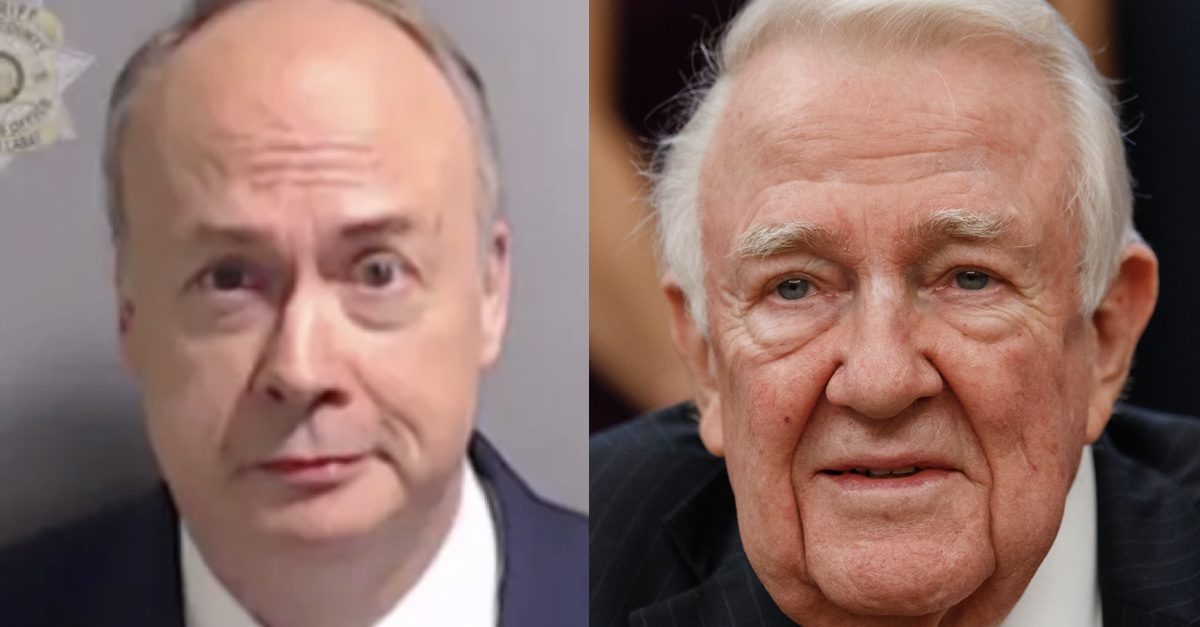
Jeffrey Clark (Fulton County Jail), Edwin Meese (AP Photo/Alex Brandon)
The 91-year-old former attorney general of the United States during the Ronald Reagan administration chimed in Saturday on the Georgia racketeering (RICO) prosecution of former DOJ assistant attorney general Jeffrey Clark, calling the case a “major affront to federal supremacy.”
Edwin Meese III, in a declaration filed before U.S. District Judge Steve Jones, the Barack Obama appointed jurist who has been handling challenges of the RICO prosecution under the federal removal statute, wrote that he was not impressed with Fulton County DA Fani Willis’ (D) case.
“I have read the Indictment in State of Georgia v. Donald J Trump, et al., and focused on the allegations therein that reference Jeffrey B. Clark, who is one of the co-defendants in the case. The Indictment alleges that Mr. Clark drafted a letter and, on December 28, 2020, sent it to his superiors at the Department of Justice (the Acting Attorney General Jeff Rosen and the Principal Associate Deputy Attorney General Richard Donoghue), seeking their approval and co signature, and again sought their approval and co-signature on January 2, 2021,” Meese began. “The letter is alleged in the Indictment to be a criminal attempted false writing the alleged falsity of which lies in the difference between 1) the position the draft letter proposed that the Department of Justice take and 2) the position regarding the election in Georgia that was adhered to by the then-Acting Attorney General Jeffrey Rosen and Principal Associate Deputy Attorney General Richard Donoghue.”
Meese expressed his belief that Clark was acting squarely within the scope of his federal office when he joined in former President Donald Trump’s efforts to overturn his 2020 election loss, despite the opposing views of DOJ as a whole on the subject of election fraud, as seen in the testimony of then-Acting Attorney General Jeffrey Rosen and Principal Associate Deputy Attorney General Richard Donoghue.
Clark was on track to become acting attorney general of the United States before Jan. 6, but Trump pumped the brakes on that as a mutiny of top leadership inside the DOJ appeared guaranteed. Though a DOJ environmental lawyer by trade, Clark had waded in decidedly different waters when he put together a never-sent draft letter urging states Trump lost to “send unauthorized slate of electors to Congress.”
Read Related Also: [Zone 7] What the Dead Know: Barbara Butcher on the Realities of Death Investigation
That letter, Rosen and Donoghue testified, falsely claimed that DOJ as an institution had “identified significant concerns that may have impacted the outcome of the election in multiple States, including the State of Georgia.”
The draft letter recommended that the Georgia General Assembly “convene in special session so that its legislators are in a position to take additional testimony, receive new evidence, and deliberate on the matter consistent with its duties under the U.S.Constitution” and held Jan. 6 out as the day of legal reckoning.
Edwin Meese responded to the above by opining that Rosen/Donoghue and Clark simply had a disagreement. Calling the Clark draft letter “quite modest in suggesting only that further investigation was warranted,” Meese asserted that DA Willis has opened a legal Pandora’s box that not even segregationists dared consider during the Kennedy years:
I am not aware of any state criminal prosecution ever being brought against a President and a senior Justice Department official like Mr. Clark for their privileged and confidential discussions of whether and how to assert federal law enforcement authority other than this new State of Georgia v. Trump, et al. Indictment. The prosecution of the President and an AAG is a major affront to federal supremacy never before seen in the history of our country. If the premise of this prosecution were to be accepted, then state law enforcement officials could arrest local U.S. Attorneys and their Assistants while they were deliberating over whether and/or how to approach a possible prosecution of state or local officials. Similarly, under Fulton County’s interpretation of federal supremacy, state or local officials could enter the Oval Office and arrest the President and his Attorney General during their deliberations over whether and to what extent to assert federal law enforcement powers against state or local officials. Not even George Wallace or Orval Faubus, during the heights of the heated civil rights-era disputes, were willing to go that far against President Kennedy and his Attorney General Robert F. Kennedy.
Read Meese’s declaration here.
Have a tip we should know? [email protected]








